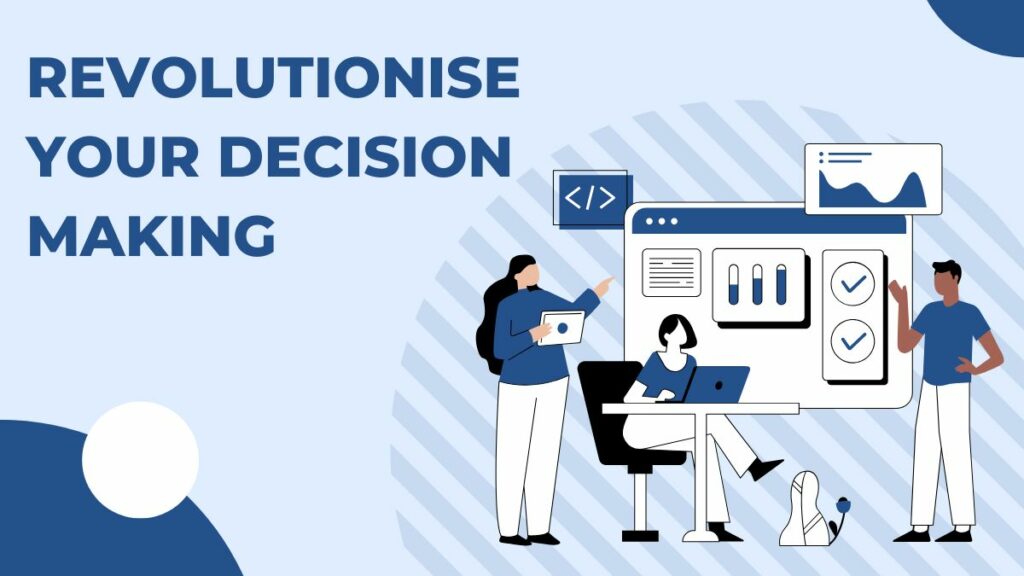Last updated on October 27th, 2024 at 08:19 pm
Last Updated on 1 year ago by Imarticus Learning
The ability to make informed decisions can set successful companies apart from the rest. Despite significant investments in modernising operations, a surprising 70% of these initiatives have failed, as highlighted in a 2018 IDC study.
What is the main reason for this alarming failure rate?
Many organisations focus heavily on technology investments without nurturing a data-centric culture. As businesses adapt to rapidly changing landscapes, understanding how to leverage data effectively becomes crucial.
This post will explore the digital decision-making landscape, uncovering key models and decision frameworks that empower organisations to make smarter, data-driven choices.
What is Data-Driven Decision-Making?
Data-based decision-making, or data-driven decision-making, refers to educators’ continuous process of collecting and analysing various data types. This includes demographic information, student achievement tests, satisfaction surveys, and process data, all of which aim to guide decisions that improve the educational process.
In a data-driven culture, organisations base their choices on solid evidence and insights from different sources, such as customer feedback, market trends, operational metrics, financial data, and other relevant information.
Instead of relying on instincts or assumptions, data-driven decision-making encourages businesses to collect, analyse, and interpret data. This helps them better understand their operations and make informed decisions.
The Importance of Digital Decision Making
As the digital landscape evolves, traditional decision-making processes often need to be revised. Organisations face an influx of data, shifting market trends, and diverse consumer behaviours.
This is where digital transformation in decision-making plays a crucial role. By leveraging technology, companies can enhance their analytical capabilities, enabling them to make data-driven decisions that align with their strategic objectives.
- Enhanced Accuracy: Utilises data to minimise errors and improve decision accuracy compared to intuition-based choices.
- Informed Choices: This approach relies on factual information and analytics, allowing organisations to make decisions that align with real market conditions.
- Increased Agility: Analyzing real-time data enables quicker responses to changing circumstances, helping businesses adapt swiftly to new trends.
- Competitive Advantage: Data-driven insights give organisations a clearer understanding of market dynamics, giving them an edge over competitors.
- Improved Risk Management: Comprehensive data analysis identifies potential risks and opportunities, helping organisations mitigate threats effectively.
- Customer-Centric Strategies: Leverages customer feedback and market trends to tailor products & services, enhancing customer satisfaction and loyalty.
- Resource Optimisation: Analyses operational metrics to identify inefficiencies, enabling better allocation of resources and cost savings.
What are the key models of digital decision-making?
Understanding the various decision-making models can significantly impact an organisation’s effectiveness.
Below are three prominent models that stand out in the digital landscape:
| Model | Description | Benefits |
| Rational Model | Explore Key Models and Frameworks in the Digital Decision-Making Landscape | It provides clarity and reduces bias in decision-making |
| Intuitive Model | Relies on instinct and experience rather than formal analysis | Allows for quick decisions in fast-paced environments |
| Incremental Model | It involves making small, gradual changes rather than sweeping reforms | Minimises risk and allows for flexibility in implementation |
Frameworks for Effective Decision-Making
Organisations can adopt specific decision frameworks that encapsulate the principles of effective decision-making.
Here are the key frameworks for effective digital decision-making:
-
The OODA Loop
Developed by military strategist John Boyd, the OODA Loop (Observe, Orient, Decide, Act) encourages continuous learning and adaptation. This framework enables organisations to assess their environments quickly, make informed decisions, and act promptly.
-
The Decision Matrix
This tool assists in evaluating options based on specific criteria. By scoring potential solutions against predetermined metrics, teams can make objective decisions that align with their organisational goals.
-
The SWOT Analysis
A classic yet effective framework, SWOT (Strengths, Weaknesses, Opportunities, Threats), helps organisations understand their internal and external environments, facilitating more strategic decision-making.
Leveraging Data for Informed Decisions
Data is the core of effective digital decision-making. Businesses can harness data analytics to identify trends, evaluate risks, and uncover opportunities. By integrating data-driven insights into their decision-making processes, organisations can create an agile and responsive operational framework.
- Identification of Opportunities and Risks: By analysing consumer preferences, market gaps, and areas for improvement, businesses can pivot effectively and seize opportunities as they arise.
- Enhanced Customer Insights: Data enables organisations to better understand their customers, leading to more tailored offerings and improved customer satisfaction.
The Role of Technology in Decision-Making
Technological advancements have revolutionised digital decision making approaches. By utilising tools such as artificial intelligence (AI) and machine learning, businesses can analyse vast amounts of data in real-time, identifying patterns and making predictions that drive strategic decisions.
Additionally, integrating these technologies into a CMO programme can help marketing leaders make informed decisions about campaign strategies, audience targeting, and resource allocation.
Accelerate Your Career with Imarticus Learning’s Strategic Chief Marketing Officers Programme
As we navigate the complexities of the modern business environment, the importance of effective decision-making models and frameworks cannot be overstated. Embracing digital transformation in decision-making will empower organisations to leverage data-driven insights, adapt to changing circumstances, and drive growth.
Imarticus Learning offers a cutting-edge CMO training programme tailored for high-potential emerging leaders and aspiring Chief Marketing Officers. The 10-month online CMO programme enables learners to achieve faster vertical career progression, launch global business initiatives, and attain their company’s business goals.
The Chief Marketing Officers program features an in-depth syllabus that builds a solid foundation for understanding customers, crafting successful marketing strategies, executing business decisions, and implementing master plans to achieve organisational goals.
Enrol in Imarticus Learning’s Strategic Chief Marketing Officers Programme today and unlock your potential as a future business leader!

